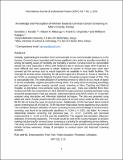| dc.contributor.author | Kandie, Geredine, J. | |
| dc.contributor.author | Mburugu, Robert, K. | |
| dc.contributor.author | Onyambu, Frank, G. | |
| dc.contributor.author | Kapigen, Millicent | |
| dc.date.accessioned | 2019-05-15T07:51:35Z | |
| dc.date.available | 2019-05-15T07:51:35Z | |
| dc.date.issued | 2019-05 | |
| dc.identifier.citation | International Journal of professional Practice (IJPP) Vol .7 No. 1, 2019 | en_US |
| dc.identifier.issn | 1-10 | |
| dc.identifier.uri | http://library.kemu.ac.ke/ijpp/index.php/ijpp/article/view/12 | |
| dc.identifier.uri | http://repository.kemu.ac.ke:8080/xmlui/handle/123456789/319 | |
| dc.description | http://library.kemu.ac.ke/ijpp/index.php/ijpp/article/view/12 | en_US |
| dc.description.abstract | Globally, epidemiological transition from communicable to non-communicable diseases is on increase with Cervical cancer associated with human papilloma virus being among leading causes of morbidity and mortality in women.Cervical cancer is preventable but majority of Kenyan women have never been screened yet free services are available in most health facilities. Cervical cancer screening for all women aged 18 to 69 years in Kenya is reported to be 3.2%as compared to the National Cervical Cancer Prevention program target of 70%.Underutilization of screening services is cited to result from lapses in service availability, negative perception among others.The study aimed at assessing knowledge and perception of women towards cervical cancer screening in Meru Teaching and Referral Hospital. A descriptive cross-sectional study design was used. Data was collected from 352 respondents (n=352) selected through purposive sampling technique using structured questionnaires. Data was cleaned, coded and entered using SPSS version 23,analysed using descriptive and inferential statistical techniques and presented using tables and charts.Results showed that 69% were aware of cervical cancer while 46.29% were not, 86.9% did not know the cause of cervical cancer.61.9% had heard about cervical cancer screening but 38.1% had not. 78.4% had never heard about human papilloma virus vaccine.The correlation between utilization of cancer screening services and knowledge of cervical cancer screening, was found to be statistically significant r= 0.294, p < 0.001, two tailed. An inverse relationship between screening and perceived pain, r= -0.117, p=0.029 and perceived embarrassment r= -0.109, p=0.041 was also established. This suggests that perception influences utilization of screening negatively.The results would help county managers in decision making and planning for cervical cancer screening as a priority for strengthening service delivery.This study recommends sustained public health education to create positive social change that will include increased awareness, change of perception to cervical cancer and improved screening practices. | en_US |
| dc.language.iso | en | en_US |
| dc.publisher | International Journal of professional practice (IJPP) | en_US |
| dc.subject | Cervical cancer screening | en_US |
| dc.title | Knowledge and Perception of Women towards Cervical Cancer Screening in Meru County, Kenya. | en_US |
| dc.type | Article | en_US |

